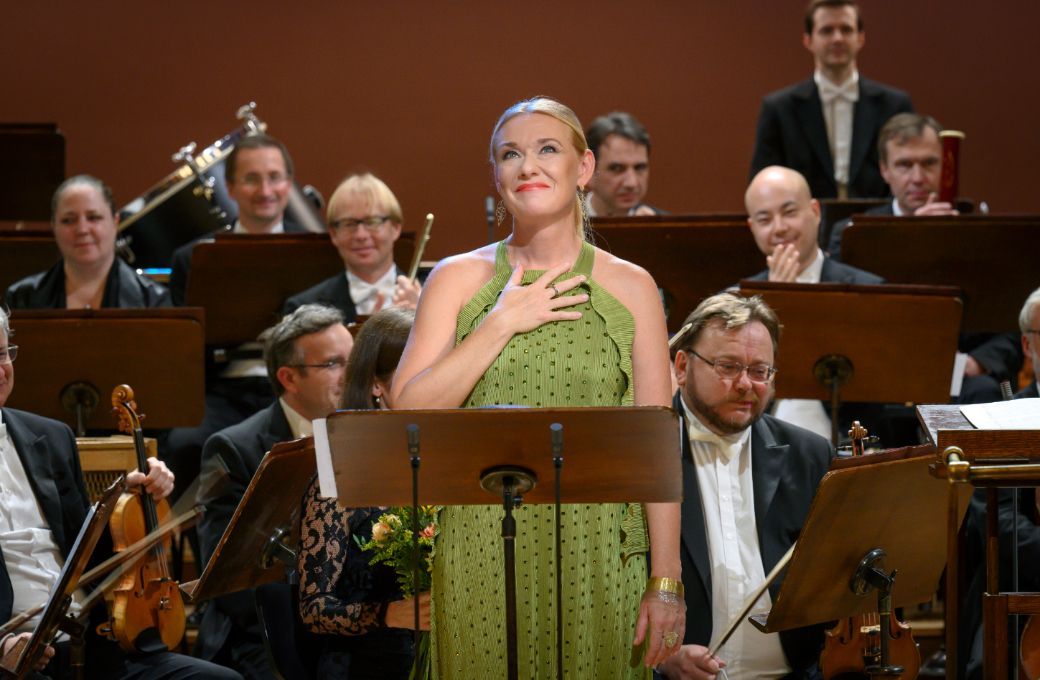It’s always a special occasion when Magdalena Kožená performs in the Czech Republic. The Brno native has fashioned a stellar international career while maintaining strong homeland ties in her repertoire, recordings and behind-the-scenes education programs. This season Kožená is sharing the spotlight with her husband Sir Simon Rattle as artists-in-residence with the Czech Philharmonic, bringing more than Czech favorites. A cosmopolitan song selection and soaring tribute to the Velvet Revolution have already exceeded expectations.

The centerpiece of their most recent appearance captured the spirit of their residency, combining lesser-known songs by Dvořák with musical poems by Terezín composers Hans Krása and Gideon Klein. Ranging across a variety of moods and subjects, the Dvořák songs were a natural fit for Kožená, letting her dig deep for powerful emotional impact – the sorrow of I dreamt last night that you were dead, regretful pride in I am that knight and heartbreak in When God was in a happy mood. While not an obvious match with the melancholy music of Terezín, Kožená’s round, golden mezzo brought grace and depth to the flat vocals of four grotesques by Krása, and tenderness to Klein’s Lullaby, an emotional prayer tightly intertwined with sensitive support from the orchestra.
Rattle showed a fine touch with the Czech repertoire in the pieces that framed the songs. The evening opened with The Wild Dove, a symphonic poem by Dvořák that the conductor built from light, elegant strings to a crisp, dramatic crescendo. The piece traces a tragic narrative but Rattle put the music first, indulging in the rich melodic flow. He expanded the dynamics and sharpened the edges for the closing work, Janáček’s Taras Bulba. The brass was the standout amid the tumult, hard and bright, and Rattle’s technical command was superb, rendering the roiling battles with balance and clarity.
Fittingly, the couple’s inaugural appearance a week earlier marked the 33rd anniversary of the Velvet Revolution. And surprisingly, there was not a Czech piece on the program. Instead it offered imaginative folk song cycles by Ravel and Bartók, and one of classical music’s great odes to humanity, Mahler’s Symphony no. 9.
Ravel’s Five Greek Folk Songs are engaging miniatures that Kožená gave wings to with animated expression, backed by glimmering tones and exotic colors in the orchestra. A refreshing departure from standard Romantic fare, they were over too soon. Bartók’s songs start on a darker palette, which gave Kožená a chance to put some bite in her vocals. The mood gradually lightens to the concluding humor of Párosító II, which she sang like a pop diva, trading lines with a tuba. Rattle supported her with rich atmospherics, by turns pensive, mischievous and rousing.
Working without a score, Rattle led a masterful version of Mahler, moving tidal waves of sound around the stage with aplomb. The monumental proportions never overwhelmed the details, and the conductor showed a virtuoso touch in evoking an elemental underpinning for the symphony’s overarching transcendence. Rattle’s genius lies in putting his stamp on the music while allowing it to unfold on its own time and terms, which in this case produced a vivid, all-encompassing journey through life...and beyond. As an affirmation of humanity’s highest aspirations, one could not have asked for better.
Great music is de rigueur for artists of this stature, inspiration harder to come by. This residency could serve as a model of both.
You can watch this performance on Symphony.live


